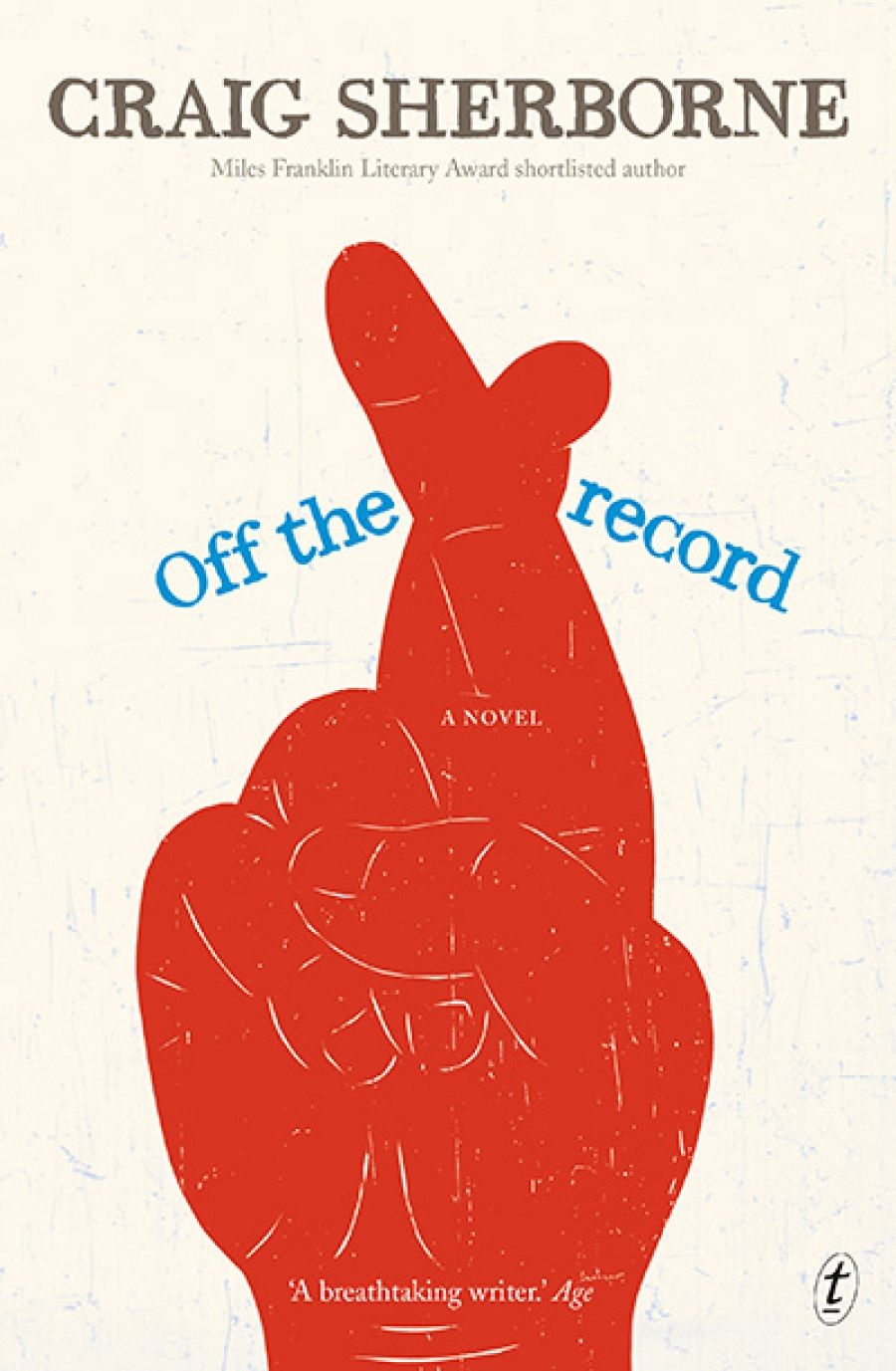
- Free Article: No
- Contents Category: Fiction
- Custom Article Title: Susan Lever reviews 'Off the Record' by Craig Sherborne
- Review Article: Yes
- Online Only: No
- Custom Highlight Text:
With a regular stream of vulgar tweets from President Trump and a tsunami of sexual harassment charges against prominent men, it is easy to be overwhelmed by the nasty side of masculine privilege in our current world. The narcissistic man who manipulates others to satisfy his sense of power has become a recognised ...
- Book 1 Title: Off the Record
- Book 1 Biblio: Text Publishing, $29.99 pb, 293 pp, 9781925603248
The narrator is a middle-aged journalist called Callum Smith who has switched from newsprint to an internet blogging site that feeds sensational news to other sources, appropriately called pry.com. His pride in his knowledge of the old grammatical bibles of Strunk and White and Fowler’s Usage has led to his nickname, Words (as in Wordsmith), and he regularly catches out his younger colleagues in solecisms that offend his pedantic standards. Grammatical standards are not the same as ethical ones, though, and Words has none of the traditional journalist’s concern for accuracy and integrity. He claims to be a writer who can make his copy ‘sing’, in particular by knowing how to ‘cook’ a crime story so that a report about a shooting accident in the country can read: In the ghettoes of the bush the children kill children. That sort of thing.
Words has two problems: he has been thrown out of the family home by his wife for a sexual indiscretion; and he is anxious to make up the drop in his income by increasing his control of pry. In negotiating his family situation, he enlists his teenage son to spy on his wife and her new male friend, and tries to ingratiate himself with the boy by ‘influencing’ his school essays. His work life is taken up with schemes to create news, such as enlisting the less scrupulous of his workmates in the ‘stoning’ of a group of born-again Christians in an attempt to expose their callous disregard for the homeless.
This journalist wields the power of knowing that everyone has his or her secrets, ripe for exposure and shame. When cornered, he simply probes and pushes until a weakness is revealed. To engage his son in deception may appear bad enough, but Words feels no qualms about blackmailing his son’s teacher into giving the boy higher marks. When, in his desperation for a new story and a heroic role as a journalistic crusader, he attempts to win the confidence of a young woman convicted of killing her baby, readers are likely to be more appalled than entertained.
No one in this novel stands up to Words or invokes a higher moral code than his. He is surrounded by a stupid boss, immoral workmates, school teachers too weak to resist him, and a wife for whom his deceptive nature appears a revelation. The only obstruction to his plans comes from those just as deceitful as he is. Words is a rogue surviving in a world where, Sherborne suggests, wit is more important than ethics. Unfortunately, he has little charm, and his cynical world view hasn’t much humour either. Sherborne deliberately leads him across the line of cherished taboos in our society – responsible and honest parenting, and the privacy of grief. It is dangerous territory.
 Craig SherborneWords is not so much an unreliable narrator as a completely self-regarding one. His self-deception lies in his belief that his major weakness is a streak of conscience and that his drinking and occasional womanising follow from his need to suppress this weakness. The irony in our awareness of his double-dealing and ludicrous vanity may be the source of the novel’s pleasure for some readers.
Craig SherborneWords is not so much an unreliable narrator as a completely self-regarding one. His self-deception lies in his belief that his major weakness is a streak of conscience and that his drinking and occasional womanising follow from his need to suppress this weakness. The irony in our awareness of his double-dealing and ludicrous vanity may be the source of the novel’s pleasure for some readers.
The novel could be read as an attack on our superficial news-hungry society, but Words is such an ordinary player, his machinations so petty, that he does seem merely a selfish individual rather than the inevitable product of the contemporary news media. There is a disturbing ambivalence in the choice of his voice to tell this story. Words may take pride in his knowledge of the English language, but he has no desire to use it with any complexity. The whole novel is written in the short punchy sentences of the internet blog. They provide a level of credibility for the voice, and may work for a website or newspaper column, but unvaried short sentences are hard to take for 280 pages.
On one level, this novel is a demonstration of Sherborne’s virtuosity as a writer. It is difficult to imagine a novel more different in tone from his last one, Tree Palace (2014), which observed the lives of a family of poorly educated itinerants in rural Victoria with extraordinary sympathy. Here, he submerges himself in a character who represents the most insensitive and ruthless aspects of sensational journalism with such credibility that it is difficult at times to keep reading.


Comments powered by CComment